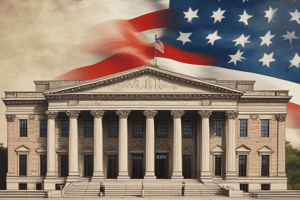Podcast
Questions and Answers
What is the significance of Marbury v. Madison?
What is the significance of Marbury v. Madison?
Established the Judicial Review
Define Judicial Review.
Define Judicial Review.
The ability of the Supreme Court to determine if a law/action is constitutional or not.
Which of the following is a protection provided by Amendment 1?
Which of the following is a protection provided by Amendment 1?
- Preventing soldiers from staying at private homes
- Freedom of speech (correct)
- Ban unreasonable searches and seizures
- Right to bear arms
What is the significance of the Declaration of Independence?
What is the significance of the Declaration of Independence?
Define popular sovereignty.
Define popular sovereignty.
What is limited government?
What is limited government?
Define social contract.
Define social contract.
Which powers belong to the federal government?
Which powers belong to the federal government?
What is one legislative check on the executive?
What is one legislative check on the executive?
What is the main purpose of Judicial Review?
What is the main purpose of Judicial Review?
The right to bear arms is protected by the Third Amendment.
The right to bear arms is protected by the Third Amendment.
Which amendment protects individuals from unreasonable searches and seizures?
Which amendment protects individuals from unreasonable searches and seizures?
Marbury v. Madison established __________ as a principle of American law.
Marbury v. Madison established __________ as a principle of American law.
Match the following amendments with their protections:
Match the following amendments with their protections:
Which of the following best defines 'Limited Government'?
Which of the following best defines 'Limited Government'?
The line of succession after the President includes the Attorney General following the Speaker of the House.
The line of succession after the President includes the Attorney General following the Speaker of the House.
What principle ensures that the power rests with the people?
What principle ensures that the power rests with the people?
The concept of a contract between the government and the governed is known as the ______.
The concept of a contract between the government and the governed is known as the ______.
Match the following branches of government with their corresponding checks:
Match the following branches of government with their corresponding checks:
Study Notes
Marbury v. Madison
- Established judicial review
Judicial Review
- Supreme Court's power to review laws and determine if they are constitutional
Amendments
- 1st Amendment: Freedom of speech, religion, press, assembly, and petition
- 2nd Amendment: Right to bear arms
- 3rd Amendment: Prevents soldiers from staying in private homes without consent
- 4th Amendment: Protects from unreasonable search and seizure
- 5th Amendment: Guarantees due process of law, prevents double jeopardy, protects against self-incrimination
- 6th Amendment: Right to a speedy and public trial, a lawyer
- 7th Amendment: Right to a jury trial in civil cases
- 8th Amendment: Protects from excessive bail and cruel and unusual punishment
- 9th Amendment: States there are other rights not listed
- 10th Amendment: Any powers not given to the federal government are reserved to the states or the people
Articles of Confederation vs. Constitution
- Articles of Confederation created a weak national government with limited powers.
- The Constitution created a stronger federal government with greater powers.
- The Articles of Confederation lacked a strong executive branch and a national court system, which led to significant weaknesses in enforcing laws and resolving disputes between states. The Constitution addressed these weaknesses by establishing a president as head of the executive branch and a Supreme Court.
Declaration of Independence
- Declared American independence from Great Britain
Popular Sovereignty
- Rule by the people where decisions are made by majority vote
Limited Government
- Government with powers limited by a constitution and ruled by the consent of the governed
Social Contract
- Agreement between the government and the governed
Federalism
- Federal powers: Declare war, regulate interstate commerce, coin money, create post offices, establish armed forces
- Concurrent powers: Taxation, establish courts, enforce laws
- State (reserved) powers: Education, licensing, elections, intrastate commerce, local government
Legislative Checks on the Executive
- Impeach and remove the President
- Reject presidential appointments
- Override vetoes
- Approve treaties
Legislative Checks on the Judiciary
- Impeach and remove judges
- Approve or reject judicial appointments
- Propose amendments to overturn court rulings
Executive Checks on the Legislative
- Veto legislation
- Call special sessions of Congress
- Propose laws
Executive Checks on the Judiciary
- Appoint judges
- Grant pardons
- Refuse to enforce court rulings
Studying That Suits You
Use AI to generate personalized quizzes and flashcards to suit your learning preferences.
Related Documents
Description
This quiz covers key concepts related to the US Constitution, including the principles of judicial review, the significance of important amendments, and the comparison between the Articles of Confederation and the Constitution. Test your knowledge on the rights guaranteed by the amendments and their implications for American law.




